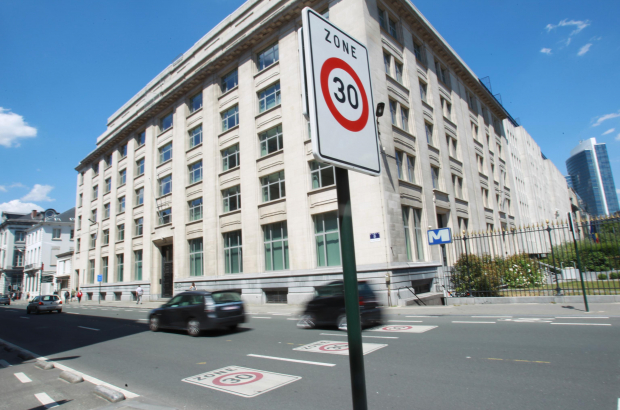- Daily & Weekly newsletters
- Buy & download The Bulletin
- Comment on our articles
Court ruling on speeding offence not a danger to Zone 30, says mobility minister
The decision by a police court magistrate in a speeding case heard last October does not pose a danger to the newly introduced Zone 30 in the Brussels Region, the office of mobility minister Elke Van den Brandt said over the weekend, despite fears it could be used by opponents of the policy to strengthen their argument against it.
A motorist was flashed by a speed camera in the commune of Schaerbeek doing 64kph in what was then already a Zone 30, several weeks before a blanket enforcement of the speed limit was brought in. Since 1 January 2021, the Brussels-Capital Region has generalised the speed limit to 30kph throughout its territory, with a few exceptions.
The man was brought before the court as his offence was more than twice the legal speed limit in the zone where he was caught. However, police court magistrate Lionel Van Damme found him not guilty, saying at the time: “The municipality of Schaerbeek has decided to incorrectly apply a speed limit of 30kph to the majority of roads, without taking into account the specific situation of each traffic axis. Establishing a zone 30 is only possible if there is a concrete danger.”
The motorist did not have to give up his licence but was instead issued with a speeding ticket and made to pay a fine. “The court considers that in the absence of any concrete danger and in view of the configuration of the area, it should be considered that a forfeiture of the right to drive would be disproportionate," the magistrate said.
This decision, that the 30kph limit should be imposed in the vicinity of "a danger", not in a general way, could serve as an argument to opponents of Zone 30, with legal experts suggesting that members of the public could cite this ruling as justification for exceeding the 30kph speed limit, especially as the verdict remains unchallenged.
However, a spokesperson for mobility minister Elke Van den Brandt stated over the weekend that “the magistrate’s interpretation is striking, but the verdict does not pose a threat to the general Zone 30.” The spokesperson added that Van den Brandt would give a press conference on the issue this week, accompanied by the Brussels prosecutor, who will explain the legal situation.
Brussels minister-president Rudi Vervoort also addressed the court decision and the consequences of it in an interview broadcast on Sunday: "The problem is that this legal action concerned a measure taken by the municipality of Schaerbeek,” he told RTL. “This is not the Brussels region as a whole." According to Vervoort, Schaerbeek has taken an "out-of-jurisdiction" decision by imposing the 30 kph before the region. The region has the jurisdiction to "change the highway code", he said.
For Rudi Vervoort, there is no question of changing the measure at the moment: "We will not change the policy,” he added. “We will see where it is a problem, where the 30kph is perhaps excessive and make a real, transparent assessment. Only through this, and with concrete figures - there is a declining mortality rate and an increasing quality of life - we can get the support for Zone 30.”
Meanwhile, around 50 people protested against the imposition of the 30 kph zone on Saturday lunchtime. The protesters gathered at the Montgomery roundabout in Woluwe-Saint-Pierre in a demonstration organised by Mauto Défense, a non-profit organisation that defends the rights of motorists and motorcyclists.
"Many studies show that imposing very low maximum speeds is harmful to the environment and significantly increases consumption," said Lucien Beckers of Mauto Défense. "Improving road safety is certainly desirable, but constantly reducing the speeds allowed disempowers and infantilises the disciplined drivers, those who make up the vast majority of motorists and motorcyclists, who comply with the road rules," he added.


















